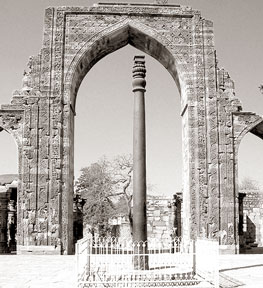|
Thoughts for Poson Poya:
The life and times of Emperor Asoka
by Gamini G. Punchihewa
|

The Asoka Pillar
|
Asoka or Dharma Asoka, the Emperor of India circa 268-231 B.C. is
still a cherished but immortal name reminiscent in ancient Jambuddipa
(India) and ancient Lanka as well.
Emperor Asoka was the grandson of the famed Emperor Chandraguptha,
the founder of the Mourya empire. He was also a contemporary of
Alexander the Great. The contemporary king of Lanka was Devanampiyatissa
who ruled Anuradhapura. Asoka and Devanampiyatissa belonged to the Sakya
clan.
Asoka’s name turned into Dharma Asoka, after he embraced Buddhism.
Emperor Asoka became a Buddhist on the advice given by Unaguptha Thera,
an erudite Buddhist teacher of the time.
The fervent advice given by this learned bhikkhu to Asoka (also
called then as Chanda Asoka) was that he should at one for his
atrocities such as killing of thousands of people and plundering their
wealth in the wars he had waged in Kalinga, the present Orisa.
Asoka’s atrocities
Asoka’s atrocities, were committed at the time of his father’s death
in Patalipura, when he was the Viceroy in Udeni, his mother’s ancestral
place. Asoka killed all his brothers to grab the throne for himself. He
became a dictator after he was enthroned.
His insatiable lust was to conquer more territories. He waged war
against the neighbouring territories. His killing spree was mostly in
Kalinga in the eighth year of his draconian rule. The battle of Kalinga
fought with thousands of warriors, elephants and a massive army was a
bloodbath. The only satisfaction, he derived was seeing for himself the
bloody trails which were perpetrated on a mass scale.
Asoka could not get over the terrible shocks of his atrocities that
disturbed him one day while pondering over the unpardonable act of
genocide committed in the past, Asoka observed a bhikkhu silently and
soberly trotting along the road.
The sight of the bhikkhu reminded the king of the past sins he had
committed. He invited the bhikkhu to his palace. Later the king came
back to his senses and disbanded his army.
The Bhikkhu went to the palace on Asoka’s request and had a discourse
with him and the king even invited him for an alms giving. Asoka was
imbibed with the bhikkhu’s solemnity and composure. The bhikkhu was a
seven-year-old Negroda Samanera.
Staunch Buddhist
It was during this time, that Asoka came to know the famed bhikkhu
Unaguptha Thera living at Mathura. He was a learned preacher of the
Vaibusika School. At Emperor Asoka’s invitation Unaguptha Thera visited
him, and preached the sublime Dhamma. He was the guiding star that
enlightened Asoka to be a Buddhist.
Later he pioneered the spread of Dhamma to the east and the west
including ancient Lanka.
Dharma Asoka’s ultimate goal was to engage himself in establishing of
peace, and constructing roadways and temples to promote Buddhism.
After embracing Buddhism, Asoka caused a resurgence throughout his
dominions which became part of his original empire Magada.
Dharma Asoka treated all citizens alike, irrespective of caste, creed
race and religion extolling the noble virtus of the Buddha Dharma.
He derived his religious inspiration from his scholar and advisor
Moggalipuththa. Asoka visited Lumbini, the birthplace of Siddharata
Gautama where he erected a stone monument in which the following
immortal words were etched Hide Buddha Jatha Sakya Muniti - Hida
Bhagavan Jathethi (Here was born Siddharata Gautama). Asoka ruled his
empire according to the tenets of the Buddha. Eugene Burnuf wrote a book
titled ‘Legends of Indian Buddhism”.
Winifred Stephen in referring to Asoka’s activities said the warrior
who had spread devastation throughout India began to engage in peace, in
building roads, digging wells, planting trees and establishing
charities.
The great monasteries and temples that Asoka built throughout the
vast dominion which his conquests had added to his original empire of
Magada. On pillars, and on rocks he engraved the articles of edicts.
They are the contemporary documents for the history of Asoka’s reign and
for the study of his religion.
Advent of Buddhism to Lanka
Dharma Asoka sent missionaries to various countries, including Lanka.
His son Mahinda Thera brought Buddhism to Lanka atop Mihintale.
Before their encounter Asoka and Devanampiyatissa were close friends.
Before Mahinda went to his mother’s country in Udeni to learn the
Dwipuhasa from the Brahmins who had gone to Lanka and had become
familiar with its language. After six months of learning they came to
Lanka to usher in Buddhism for the first time there.
Asoka’s daughter Sangamiththa Theri with her clan of 11 bhikkunis
brought the sapling of the Sri Maha Bodhi at Buddhagaya where the Buddha
attained Enlightment, and planted it in Anuradhapura.
This hallowed Bo tree stands in all its sanctity as the oldest tree
in the world. The original tree at Buddhagaya is said to have been
destroyed by Emperor Asoka’s queens.
Though Buddhism was not rooted in India Jawaharlal Nehru had held
Buddhism in high esteem and as Prime Minister of India he moved a
resolution to have the Dhamma Chakka, the symbol of Buddhism in the
national flag of India.
The celebrated English author, H.G. Wells in his ‘The Outline of
History’ says of Emperor Asoka: ‘With fidelity that amidst the
ten-thousands of monarchs that crowd the columns of history - the name
of Asoka shines and shines almost alone as a star.
“All that we are is the result of what we have thought.
It is founded on our thoughts, it is made up our thoughts”
“If a man speaks or acts with an evil thought pain follows him,
As the wheel follows the foot of the ox that draws the wagon.”
-Buddha.
|

